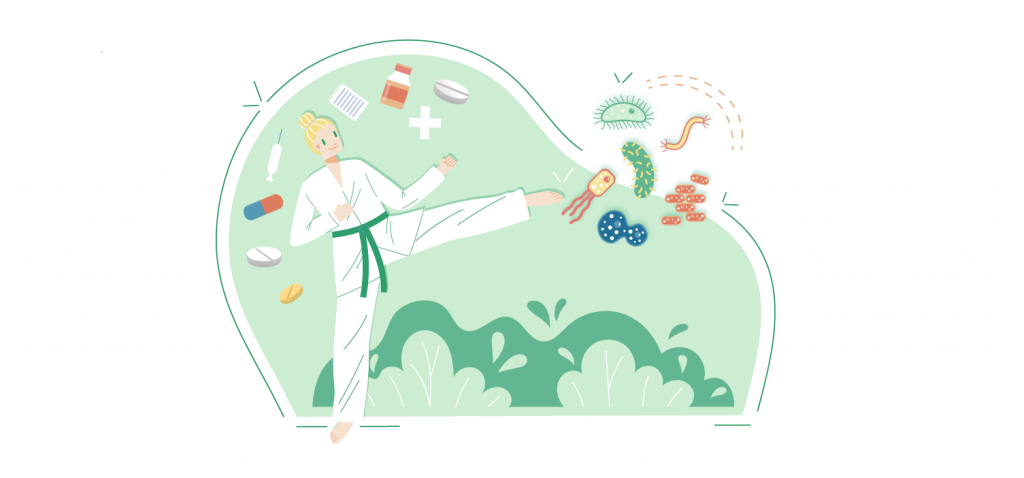It’s surprisingly essential for the everyday person to understand antibiotics. Not only for the safety of yourself and your loved ones, but it will also allow you to assist in controlling the growing threat of antibiotic resistance.
What Are Antibiotics?
Antibiotics, otherwise known as antibacterials or antimicrobials, are medications that are used to treat bacterial infections. They do this by either killing the bacteria, or by stopping them from growing or multiplying.
Most antibiotics are prescription medications, but you can get some over the counter in the form of creams, ointments or lotions for skin infections.
Antibiotics cover a wide range of medicines that have different ingredients. Which is why you can be allergic to some types like penicillin, but not others.
Uses of Antibiotics
Doctors will prescribe or recommend antibiotics to either prevent or treat bacterial infections. Antibiotics used to prevent infections are usually given before surgery. This is known as the prophylactic use of antibiotics.
What are they used to treat?
As previously mentioned, they are used to treat infections caused by bacteria, but are ineffective against viruses or infections caused by fungi. The problem here is that the symptoms for a viral and bacterial infection are often quite similar. Your doctor may be able to determine the cause of your infection from a physical exam, but it’s not uncommon to have further blood or urine tests to be sure.
Some of the most common bacterial infections are:
- UTIs (Urinary Tract Infections)
- Sinus Infections
- Ear Infections
- Strep Throat
You can also use antibiotics to treat parasitic infections, as well as improve skin conditions such as acne.
When will they be prescribed?
Mild bacterial infections will usually be cleared by the body’s immune system. In these cases, you may not be recommended any antibiotics as they won’t actually do too much to help you on the road to recovery. The treatment of mild infections, however, is not a set in stone process and will be decided on a case by case basis.
For more serious infections, like meningitis or pneumonia, you will need antibiotics as they can save your life. Similarly, urinary infections that may be mild on their own, often require antibiotics so that they don’t spread to your kidneys.
These are the most common reasons they may be prescribed, but again, it will be a case by case in some instances, so always speak to your doctor or pharmacist about what treatment will work best for you.
Of course as antibiotics are used to treat bacterial infections, not viral illnesses as is commonly believed. If you do have a virus, causing a cold or flu for example, it will be recommended that you use over the counter medication.
When should you not take antibiotics?
The most common reason for not being able to take an antibiotic is if you’ve had an allergic reaction to one. For the most part, everyone can take some form of antibiotic as it’s unlikely that you will be allergic to all of them. If you have had an allergic reaction to an antibiotic in the past, in most cases, a healthcare professional or your doctor will be able to recommend one that may be more suitable to you.
If you’re pregnant, it’s more complicated than that as there are some that you can not take for your safety and the safety of your baby. Your doctor should be able to advise you on this.
Regardless of what situation you’re in, if you are going to be prescribed an antibiotic, ensure you inform the doctor of any other medication you are taking, as well as any concern you may have about how you will react to the medication.
Most Common Types of Antibiotics
There are so many types of antibiotics, covering a plethora of conditions, branding, and needs.
Antibiotics Types / Classifications
An important thing to be aware of is that antibiotics come in a lot of forms. They can be tablets, capsules, creams, liquids or ointments, with a variety of ingredients. Which type you take or be prescribed depends on the infection you have, the cause (bacteria or parasite) of your infection, the location, and you.
Apart from that, there are a number of other factors that will affect what type of antibiotic you should take, or will be recommended. These include:
- Common side effects
- The severity of your infection
- Previous allergic reactions to antibiotics
- If you’re currently breastfeeding or pregnant
- The dosing schedule
- Your kidney and liver health
Antibiotics Names
Like most medications, antibiotics come in a variety of brand names. Each antibiotic is grouped together according to how they work, as each will only work against certain types of bacteria or parasites.
The main types of antibiotic include:
- Penicillins – eg. phenoxymethylpenicillin, flucloxacillin and amoxicillin.
- Nitrofurantoin – used for urinary infections.
- Aminoglycosides – eg. gentamicin and tobramycin.
- Cephalosporins – eg. cefaclor, cefadroxil and cefalexin.
- Macrolides – eg. erythromycin, azithromycin and clarithromycin.
- Quinolones – eg. ciprofloxacin, levofloxacin and norfloxacin.
- Sulfonamides and trimethoprim – eg. co-trimoxazole.
- Tetracyclines – eg. tetracycline, doxycycline and lymecycline.
- Metronidazole and tinidazole
- Clindamycin
Making a note of the type of antibiotic you’ve taken could be really helpful should you suffer an allergic reaction or unwanted side effect as doctors may need this information in the future.
How Do They Work?
The immune system uses white blood cells to attack harmful bacteria and fight off an infection should one occur. However sometimes your immune system isn’t able to do this on its own. Possibly because there are too many harmful bacteria, or due to the strength of your immune system, or lack thereof. It’s in these circumstances where antibiotics become necessary.
Antibiotics fight bacterial infections by killing bacteria or stopping/slowing down its growth. They do this by:
- Interfering with the reproduction (or multiplication) of the bacteria
- Attacking the wall that surrounds the bacteria
- Stop the production of protein within the bacteria
A bactericidal antibiotic kills the bacteria by interfering with the formation of the bacterial cell, whereas a bacteriostatic antibiotic stops the bacteria from multiplying.
How long does it take for antibiotics to take effect?
While these processes start as soon as you start taking the antibiotics, the effect on how you feel will generally take a bit longer. For example, if you have an infection that’s made you feel unwell, it may take two to three days to start feeling better.
In many cases, you will feel better before you’ve finished with the prescribed course of antibiotics, which generally lasts 7 to 14 days. Regardless of this, it’s important to continue until you’ve finished the course to ensure the infection is fully beaten, and to help prevent antibiotic resistance.
How to Get Antibiotics
In the UK, antibiotics are only available from the chemist, with a prescription for the most part. Even with getting topical antibiotics, it’s best to get medical advice before taking any.
If you are suffering symptoms that may suggest that you may have an infection, it’s best to speak to your doctor or pharmacist about what the best course of action may be. They will then either recommend or prescribe a treatment for you.
In some cases, people have leftover antibiotics from previous conditions and take them when they are feeling under the weather. It’s really important to not take antibiotics unnecessarily and without any advice to do so. Always speak to a medical professional first.
How to Use Antibiotics
Bottom line of taking any form of antibiotic is to take it the right way. Follow the prescriber’s orders, and the advice on the leaflet. Failing to do so would result in them not working as well as they should due to affecting their absorption, causing the bacteria to become resistant to the antibiotic if they weren’t all killed.
How to take antibiotics effectively
As mentioned, take them correctly. What methods you need to follow will be different based on the antibiotics you take. Some suggest the time of day you should take your medication, whether or not you have a full stomach, etc. The most effective way to take them is honestly to do exactly what you’re told. Speak to your doctor or pharmacist if you’re unsure.
However, naturally, things go wrong, and we all make mistakes. But it’s important to know what to do if that happens.
- If you miss a dose: If you’ve forgotten to take a dose of your antibiotics, take the dose as soon as you remember and then continue your course as planned. However, if you notice you’ve missed the dose when it’s almost time to the next one, just skip the dose and continue onto your regular schedule. Never take a double dose.
- If you take an extra dose: If you’ve accidentally taken more doses that you should have, the steps to take depend on what exactly you’ve done. If you’ve taken two doses closer together than recommended, there’s a greater risk of experiencing side effects such as stomach pains, nausea, or diarrhea. Aside from that, it’s unlikely to cause any serious complications. If, however, you’ve taken more than one extra dose, speak to your GP or call NHS 111 as soon as possible.
Taking antibiotics with other substances
Antibiotics tend to interact with other things you may be taking. The problem with this is that it means that you may react to the antibiotics differently than you planned. Things that can interact most commonly with your antibiotics include:
- Food
- Medication
- Alcohol
With medication you should ask your GP or pharmacist if it’s safe to take antibiotics with them. Antibiotics don’t generally have an effect on the contraceptive pill, so you can continue to take them as normal. However you should still speak to your doctor, nurse or pharmacist as they may recommend that you use another form of contraception such as a condom during the course of taking the antibiotics.
It is generally recommended that you don’t drink alcohol while taking any antibiotics. But it is generally safe in moderation. With the exception of metronidazole or tinidazole; it is best to entirely avoid alcohol during the course of the medication and for 48 hours due to the side effects it can cause.
How long is the treatment?
The length of treatment of antibiotics varies quite a bit. It depends on the severity of your infection, the type of infection, and how your body reacts to the medication. Antibiotics treatments can last anywhere from a few days to several months.
Side Effects of Using Antibiotics
Quick disclaimer, there are so many possible side-effects of antibiotics. There are common ones however, and ones that have been reported that you should definitely look out for. So this is what we’ll go through here. If you are however already taking antibiotics, you will be able to see on the leaflet a list of side effects associated with the specific ones you are taking, as well as how to report any new ones that aren’t listed.
Common side effects
Most antibiotics cause similar side effects. These can be:
- upset stomach
- nausea
- diarrhea
- vomiting
- rashes
The side effects affecting your stomach can sometimes be relieved if you were to take your antibiotics with food. However this does depend on what exactly you’re taking. Stomach upset tends to go away once you’ve stopped taking the medication, but speak to your doctor if it doesn’t.
As antibiotics can kill off some good bacteria, such as normal defence bacteria in the bowel or vagina, it can cause some bad bacterias to grow such as thrush.
Allergic reactions
Some people do develop allergic reactions to antibiotics, with penicillin being the most common antibiotic to cause an allergic reaction. An allergic reaction to an antibiotic can be immediate or delayed. Signs of an allergic reaction include:
- Shortness of breath
- Rashes
- Hives
- Fainting
- Swelling of the face, lips or tongue
If you do experience any of the symptoms above, stop taking the antibiotics immediately. For skin reactions, speak to your doctor. For trouble breathing, call 999.
There are many other severe reactions to antibiotics that could unfortunately happen, so it’s important to continuously pay attention to how you feel.
Reporting side effects
There is a Yellow Card Scheme, run by the Medicines and Healthcare Products Regulatory Agency (MHRA), that allows you to report suspected side effects of any medication that you are taking.
Make sure you tell your doctor if you experience any of the following when taking antibiotics:
- Allergic reactions: signs include shortness of breath, rashes, fives, swelling or fainting
- Vaginal thrush: signs include vaginal itching or unusual discharge
- Oral thrush: white patches on the tongue
- Infection of the gut: severe watery diarrhea and abdominal cramps
- Vomiting
What is Antibiotic Resistance?
“Antibiotic resistance is one of the biggest threats to global health, food security, and development today.” – World Health Organisation
Antibiotic resistance is when bacteria can no longer be killed or controlled by antibiotics. In worst case scenarios, there are no effective treatments for the conditions, sometimes referred to as superbugs. Studies have shown that each year 2 million people are infected with antibiotic resistant bacteria that results in approximately 23,000 deaths.
The NHS is actively trying to reduce the use of antibiotics for less serious conditions so as to prevent them from becoming ineffective in situations where they could be lifesaving.
Ways you can help
Fortunately, there are things that we can do to help reduce the threat of antibiotic resistance, both through infection prevention and treatment. These include:
- Only using antibiotics prescribed by a health professional
- If your health professional advises you against using antibiotics as they are not necessary, don’t demand them
- Never share your antibiotics with others
- Never use leftover antibiotics, unless advised to do so by a health professional
- Always follow the instructions of the prescriber and on the leaflet of your antibiotics
- Regularly wash your hands
- Prepare food hygienically
- Avoid close contact with those that are unwell where possible
- Practice safe sex
- Keep up to date with your vaccinations
Healthera
Healthera operates a leading healthcare marketplace that provides patients with medicines, healthcare services and products through the largest digital platform of pharmacies and GPs in the UK, including national chains and independent providers. Download Healthera App to order NHS repeat prescription online!


